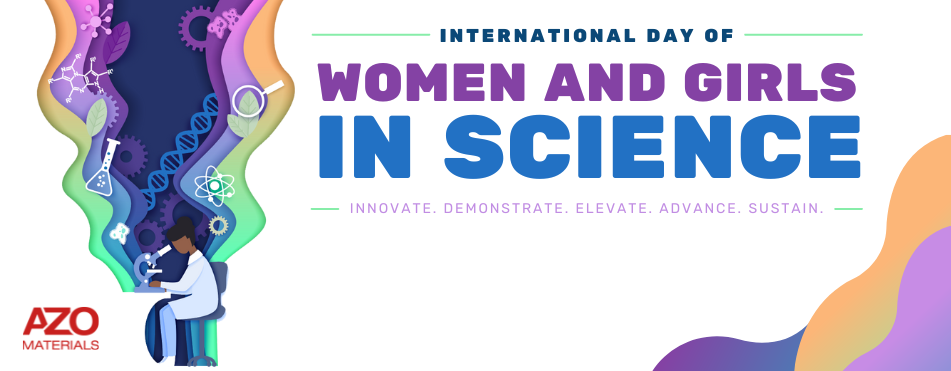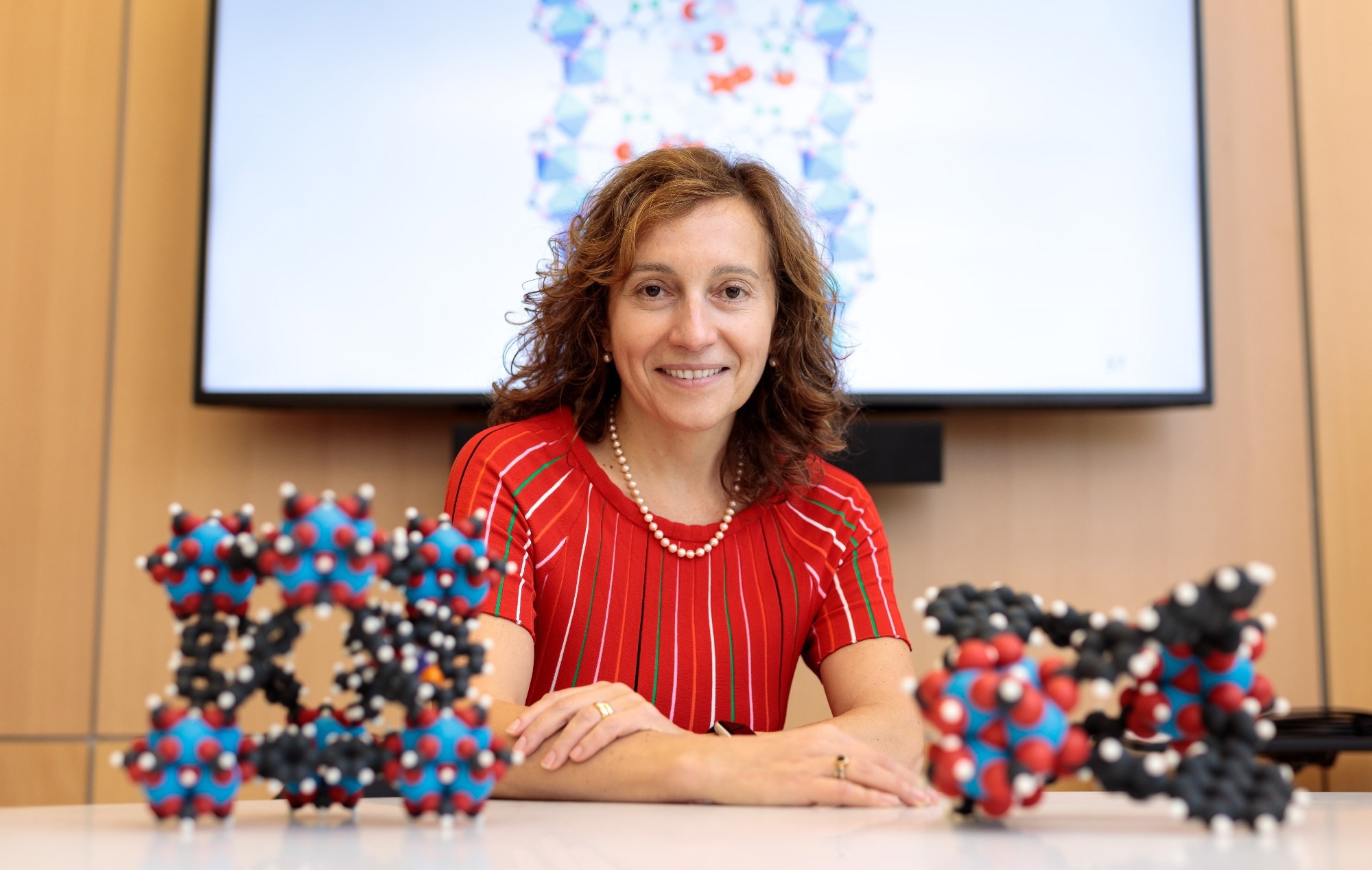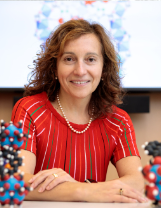
Ahead of the International Day of Women and Girls in Science, AZoM speaks with Dr. Laura Gagliardi, a Professor of Chemistry at the University of Chicago. Laura discusses her passion for chemistry and the importance of women and girls in STEM sectors such as her own.
Please can you introduce yourself and your current professional role?
I am Laura Gagliardi and I am the Richard and Kathy Leventhal Professor of Chemistry and Molecular Engineering at the University of Chicago.
How did you start out in science, and what inspired you to continue pursuing a profession in STEM?
I have always been curious about science in general since a young age and in particular about chemistry. For me, chemistry was the most fascinating topic in high school. I studied Latin, Greek, math, and physics. I loved them all. Chemistry combined the fascinating aspects of all of these disciplines. It had the rigor of Latin, the philosophical subtlety of Greek and physics, and the logic of math.
My mother has been very inspirational throughout my whole life. She was a high-school math teacher. She has inspired me from an earliy age to be an educator and a scientist and she has encouraged me to pursue my own career and find passion in my work.
I was impressed when as a young girl my mother quoted for me “The Wrench“ by Primo Levi, “…Loving your work represents the best concrete approximation to happiness on earth…The pleasure of watching your creature growing. After you have finished it, you look at it and you think that it will live longer than you do and that it may be useful to someone who you do not know yet and who does not know you". I have always really appreciated Primo Levi because of what he went through in life (he was in a concentration camp) and his ability to describe his scientific career in a very empathetic way.

What drew you to theoretical chemistry as a discipline, and why do you enjoy it?
Chemistry is an amazing discipline because it is at the core of all sciences and engineering and one can embrace chemistry from so many different perspectives. If one thinks about the major challenge of our planet, namely global warming, it is clear that chemistry plays a fundamental role. At the same time, one can reflect on what happened in 2020, namely the COVID pandemic, and also in this case we see the key role of chemistry together with other sciences.
What I think is fascinating is that in chemistry one can “make things” (like new molecules, new reactions) and “understand things” by analytical means. The two aspects are not, by any means, mutually exclusive. I belong to the category of those who want to “understand things” and “make them” on a computer. I am a theoretical and computational chemist. I think the role of theoretical and computational chemistry is very important today because we truly have the possibility to explain phenomena and make predictions. In this respect, theory/computation is extremely useful in combination with experiments when a self-sustained loop can be created.
However, the role of theory/comp is not to agree with experiments all the time, but rather to find reasonable explanations for what may happen in a reaction or any chemical phenomenon and try to give guidance to experimentalists in observing that phenomenon. With access to big data and artificial intelligence, chemistry plays an even more powerful role, because now we can generate more data faster and identify patterns that otherwise would be neglected.
You are a Professor in the Department of Chemistry at the University of Chicago as well as director of the Chicago Center for Theoretical Chemistry. Is there a close relationship between your teaching and leadership roles and the research you conduct?
Besides the leadership roles at U Chicago, I advise a group of about 18-20 graduate students and postdocs who perform research in theoretical chemistry, plus about 4-5 undergraduates every year. This role is in between being a researcher and a teacher because we advance new discoveries in the field, but my responsibility is mainly to mentor these young researchers and prepare them for their future careers. So besides research, we talk about their professional growth and how we/they can make a difference in society.
What is your current research focus?
My group and I are a diverse group of chemistry and materials scientists and molecular engineers with a wide range of research backgrounds, invested in posing new and relevant questions that we can then answer with theoretical and computational modeling. We develop and employ advanced quantum and classical simulations as well as data science to discover and understand the next generation of chemical systems and materials: catalysts that are more sustainable, photovoltaics that are more efficient, and qubits that are more reliable.
You have recently been appointed to the German Academy of Sciences Leopoldina, which is ‘the oldest continuously existing academy of natural sciences and medicine in the world’. How significant is this appointment to you?
I feel very honored by this recognition because of the prestige of the Institution. Being a member of Leopoldina is particularly important for me because I would like to keep connections with European scientific institutions since I was raised and educated in Europe. Science has no borders of any type in my opinion and it is important to collaborate and exchange opinions and knowledge with people from all over the world. This is a unique opportunity.
Looking back over your career as a whole, what stands out to you as being particularly important or enjoyable?
I started my independent career in Italy. It was very different compared to the USA. Italian universities are excellent places where you can get an education for free, and I think I received outstanding preparation. However, the conditions to perform state-of-the-art research are not the best. There is not enough funding for research. Young faculty do not have the means to be independent in their research at an early stage. In 2005, I had the opportunity to move to the University of Geneva, Switzerland, as an associate professor, and that was a game changer for my career.
Laura Gagliardi talks to Chemistry World about the boycott of a chemistry conference
In 2015 Laura Gagliardi talks to Chemistry World about the boycott of a chemistry conference. Video Credit: Chemistry World / Youtube.com
In 2009 I moved to the USA. It was challenging for me because I did not know how the American system worked because I had not been educated in the USA, but I have been lucky and successful. I did a Ph.D. in theoretical chemistry in which I developed advanced electronic structure theories. I applied them to very small molecules (like Be2 and BH). I then became interested in actinide chemistry when I was a postdoc in the UK.
Over the course of my career, I have become interested in novel chemical systems with increasing complexity, but I have tried to continue applying advanced methods, like those in my Ph.D. The desire to continue using that level of accuracy has pushed me out of my comfort zone and along the way, I had to develop novel methodologies that would allow me to study systems like metal-organic frameworks, catalysis, etc. Another key to my success was the collaboration with experimentalists. Theorists can end up developing super-sophisticated methods but use them all the time only on toy systems. On the other hand, when one collaborates with experimentalists, one is facing real and complex problems and one has to make one’s methodologies more practical and useful.
Many individuals have experienced additional hurdles in their professional careers due to their ethnicity and/or gender. What more should be done to prevent and address such biases?
As a woman, I have really gone through a path in which I have experienced some of these hurdles. In my home country, when I was a student, there were very few women in theoretical chemistry, and we were just decorations to a professional environment. When I was in Cambridge, UK, as a postdoc, at the end of the 1990s and early 2000s, there was not a single female chemistry professor at the University of Cambridge. Now, of course, things are changing, and we talk a lot about these issues. Because of my experience, I can share things in a very open way with the younger generation. So, I think outreach is very important, and I do it with pleasure. It is also important to have a core number of people of a given ethnicity and/or gender in every professional environment. In such a way they can talk to each other and feel stronger and they can serve as role models to the next generation.
For women and other underrepresented groups in science, it is very hard to speak up. Personally, I found that when there were more people like me, it was easier to express my opinions and to feel less uncomfortable if someone tried to put me down.
Do you have any advice for young women or girls who wish to pursue a career in STEM?
For young people, it may be challenging at the beginning because they may feel that they are surrounded by people who are smarter than them, and thus, that they will not succeed. I always tell them to believe in themselves and to not worry if sometimes they feel inadequate, because this is part of the academic growth process. Unfortunately, they may find themselves in an uncomfortable position at times, and in these situations, it is important for them to talk to people they trust and who can give them some advice. I would suggest trying to find a good mentor, a person who does not just want you to publish a certain number of papers per year for their celebrity, but that instead really tries to help you grow as a person and teaches you, for example, how to give good presentations, how to write papers, how to deal with these difficult situations, and also how to behave as a scientist. Behaving as a scientist is also about communication, because you have to communicate with people to convey your understanding.
I think women should be encouraged to undertake a STEM career from early on in their life. There should be opportunities for everyone at all ages to approach STEM and enjoy it, and this should be achieved at all levels of society. It is not a problem that can be addressed only in higher education. We, as educators, should try our best to be as inclusive as possible in teaching chemistry/science and the passion for research, but society as a whole has to embrace a much bigger challenge. Speaking about the USA, where I am currently working, this is a country of opportunities, but there is a large gap in the quality of the education (not to talk about health care) that people can receive, and this creates big discrepancies.
Are there any women in science who particularly inspire you?
My mother was certainly inspirational and some of my teachers were as well. When I started as a Ph.D. student in theoretical chemistry there were not many women around me whom I could look at as role models. My true hero is Professor Emily Carter, who is only a few years older than me. I have always looked at her as a role model. When I saw her successes and achievements, I told myself that I might also have a chance. It is important to have role models like Emily who can help delineate your path. I also appreciate the fact that she is not scared to openly criticize the system when she thinks it is not right and then she fixes it. Nowadays I admire several women in my field who are world leaders in science, and at the same time, they openly criticize the system when there are issues and try to fix them.
Find our other Women in Science Day features here!
Where can readers find more information?
This is my website: https://gagliardigroup.uchicago.edu/
Laura Gagliardi talks to Chemistry World about the boycott of a chemistry conference: https://www.youtube.com/watch?v=LWR6bI8X_ic
Prof.Laura Gagliardi, Department of Chemistry, University of Chicago_Interviewing Eminent Scientists: https://www.youtube.com/watch?v=shI7tAMtbcg
About Laura Gagliardi
 Laura Gagliardi is Richard and Kathy Leventhal Professor of Chemistry and Molecular Engineering at the University of Chicago and the James Franck Institute. At the University of Chicago, she is the Director of the Chicago Center for Theoretical Chemistry and the Director of the Catalyst Design for Decarbonization Center. Dr. Gagliardi also leads the Gagliardi Group, which is composed of scientists and engineers who develop and employ advanced quantum and classical simulations as well as data science to discover and understand the next generation of chemical systems and materials. Previously, she was the McKnight Presidential Endowed Chair and Distinguished McKnight University Professor at the University of Minnesota. She obtained a PhD, JD, and a master’s in chemistry from the University of Bologna.
Laura Gagliardi is Richard and Kathy Leventhal Professor of Chemistry and Molecular Engineering at the University of Chicago and the James Franck Institute. At the University of Chicago, she is the Director of the Chicago Center for Theoretical Chemistry and the Director of the Catalyst Design for Decarbonization Center. Dr. Gagliardi also leads the Gagliardi Group, which is composed of scientists and engineers who develop and employ advanced quantum and classical simulations as well as data science to discover and understand the next generation of chemical systems and materials. Previously, she was the McKnight Presidential Endowed Chair and Distinguished McKnight University Professor at the University of Minnesota. She obtained a PhD, JD, and a master’s in chemistry from the University of Bologna.
Laura Gagliardi has received many recognitions from the chemistry community, including the 2021 Faraday Lectureship Prize of the Royal Society of Chemistry, the Peter Debye Award in Physical Chemistry from the American Chemical Society in 2020, the Award in Theoretical Chemistry from the Physical Chemistry Division of the American Chemical Society in 2019, the Humboldt Research Award in 2018, and the Bourke Award of the Royal Society of Chemistry in 2016. Moreover, she is an elected member of the Academia Europaea (2018), of the International Academy of Quantum Molecular Science (2019), and of the American Academy of Arts and Sciences (2020), the USA National Academy of Sciences (2021), the German National Academy of Sciences Leopoldina (2022).
Disclaimer: The views expressed here are those of the interviewee and do not necessarily represent the views of AZoM.com Limited (T/A) AZoNetwork, the owner and operator of this website. This disclaimer forms part of the Terms and Conditions of use of this website.